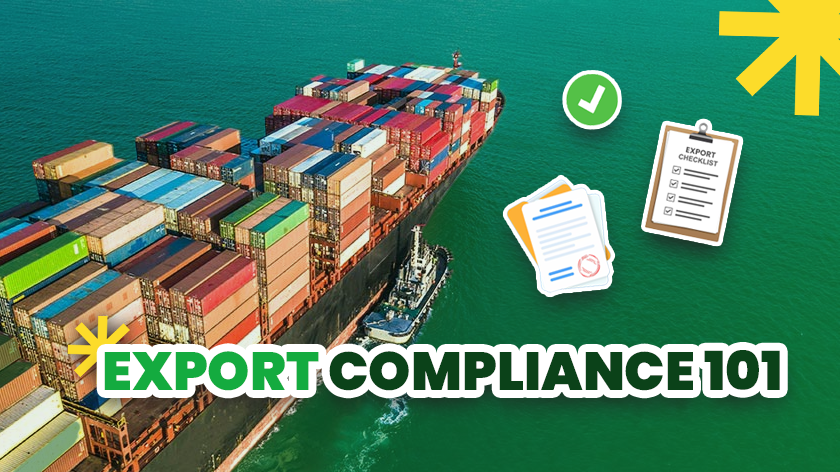Export Compliance 101: What Every Filipino Exporter Should Know
by Jennifer Victoria Garrucho on Jul 29, 2025

A beginner-friendly guide to compliant shipping
Are you thinking of exporting your products from the Philippines?
Exporting can open up incredible opportunities for Filipino entrepreneurs and SMEs—but missing a single compliance requirement could delay your shipment, cost you money, or even put your business at legal risk.
This blog is here to make compliance simple. Whether you’re a new exporter or scaling up, we’ll break down the essentials and show you how ZendEase can help you ship with confidence and stay compliant from day one.
What is Export Compliance and Why It Matters
Export compliance refers to the legal and regulatory rules that exporters must follow when shipping goods abroad. These rules ensure your products are allowed to leave the country and be received at the destination.
Why it’s important:
-
Avoid customs holds, fines, or rejections
Non-compliance can cause your shipments to be delayed, rejected, or penalized by customs authorities—costing you time and money.
-
Protect your brand and prevent legal issues
Meeting export regulations helps you avoid lawsuits, penalties, or damage to your reputation that could impact your business in the long term.
-
Ensure smooth, uninterrupted trade
Compliance ensures that your shipments move efficiently across borders without delays caused by missing permits or incorrect paperwork.
-
Maintain good standing with local and international authorities
Following proper export procedures builds your credibility and maintains good standing with customs, trade regulators, and global partners.
ZendEase helps you navigate these rules with ease—making sure you’re compliant before your shipment even leaves the country.
Key Export Compliance Requirements in the Philippines
Now that you understand why compliance matters, let's review the essential requirements that every exporter in the Philippines must fulfill. Below are the basic yet critical steps that help ensure your shipments are legal, well-documented, and ready to move across borders smoothly.
-
Business Registration & Permits
- Register your business with DTI or SEC
- Secure a valid BIR Certificate and Mayor’s Permit
Have these ready before engaging in any export transactions. ZendEase can guide you through these permits and their requirements and assist with processing them if needed.
-
Exporter Accreditation
- Must be registered with the Bureau of Customs (BOC)
- Additional certifications may apply depending on your product and business type
ZendEase helps you determine if and when accreditation is required for your goods. We also guide you through BOC's requirements so you know what to expect during your export or import journey.
-
Correct HS Code Classification
Every product must be classified using the Harmonized System (HS) Code, which determines duties and customs regulations abroad.
Why it matters:- A wrong HS code can result in higher duties, fines, or shipment rejections.
ZendEase helps ensure proper classification based on your commodity, reducing costly errors.
-
Required Export Documentation
Essential documents include:
- Commercial Invoice
- Packing List
- Export Declaration (submitted via BOC)
- Product-specific permits (e.g. FDA)
ZendEase helps clients with drafting the Export Declaration (ED) and processing it with the Bureau of Customs. If needed, we can also assist with preparing the required prerequisites—such as drafting the Commercial Invoice (CI) and Packing List (PL), booking the shipment, or processing an application for an export permit.
-
Compliance with Trade Restrictions
Some products may fall under special regulations, such as:
-
Items that are restricted or banned from export
These may include endangered species, cultural artifacts, or other goods protected by law. -
Products that require special permits or handling
For example, food items, electronics, chemicals, or medical supplies may require additional documentation, certifications, or packaging based on their nature and the regulations of the destination country.
ZendEase stays up to date with current export restrictions and guides you on what can legally be shipped.
-
Common Mistakes to Avoid
Export compliance is often mishandled due to:
- Incomplete or inaccurate documentation
- Misclassified products
- Ignoring country-specific rules
- Failing to plan around customs delays or holidays
Any of these can result in penalties, delays, or rejected shipments.
ZendEase helps prevent these issues with expert review and compliance guidance built into every shipment.
How ZendEase Helps You Stay Compliant
ZendEase isn’t just a freight forwarder—we’re your logistics compliance partner.
Here’s how we help:
- Assist with preparing complete and accurate documents
- Ensure correct HS code classification
- Advise on legal restrictions and special permits
- Coordinate with customs brokers for clearance
- Flag country-specific regulations for each shipment
- Provide real-time updates to avoid unexpected penalties or fees
Whether it’s your first shipment or your fiftieth, ZendEase helps you stay compliant and stress-free.
Tips to Stay Export-Compliant as an SME
- Keep all documentation organized and up to date
- Understand Incoterms and who is responsible for duties
- Label packages correctly and follow destination packaging rules
- Research destination country regulations in advance
- Work with a trusted logistics partner like ZendEase
Compliance Is Key to Export Success
Skipping export compliance is like skipping insurance—until something goes wrong. With ZendEase by your side, you won’t have to second-guess the process. We simplify every step so you can focus on growing your business across borders rather than battling with customs or government agencies.
Ready to Take Your Exports Global?
Partner with ZendEase today and get the expert support you need to stay compliant, minimize risks, and ensure smooth delivery.
Call us today to schedule your consultation so you can start shipping with ease and confidence.